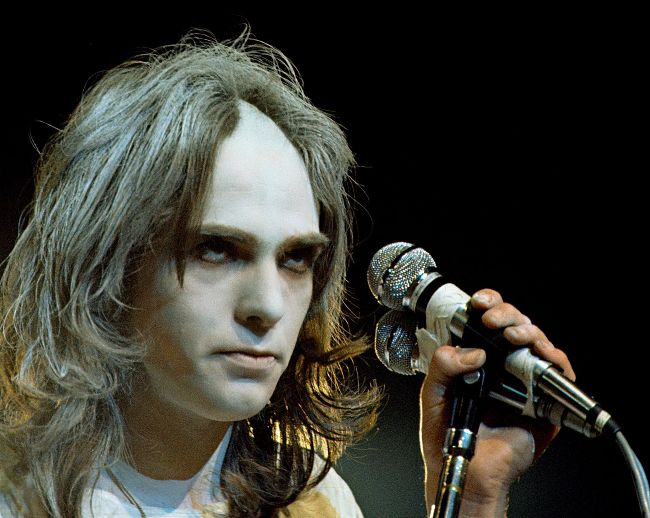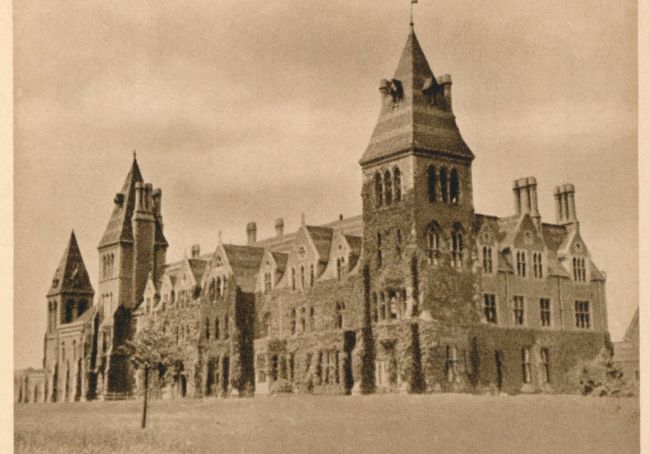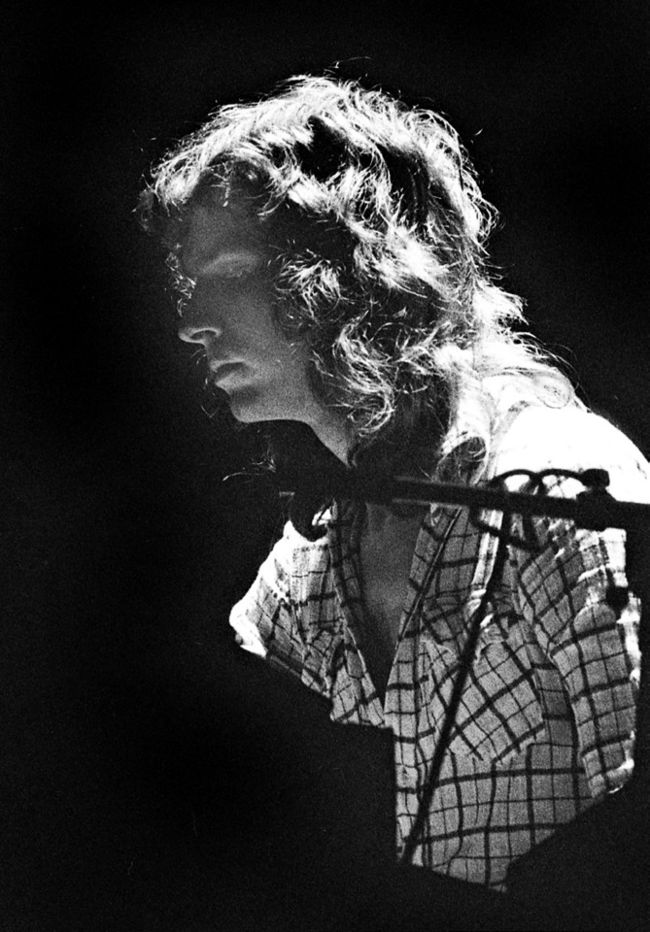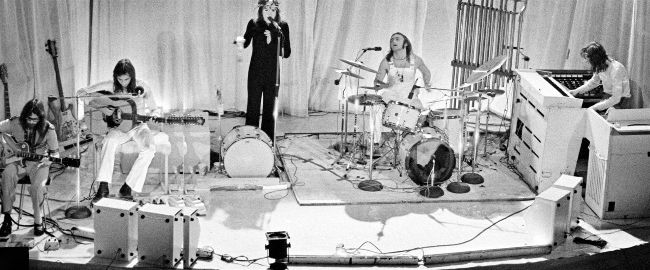ALPHA & OMEGA
Eccentric, theatrical, abstruse, GENESIS battled industry indifference, audience bafflement and internal rivalry to make music they variously describe as a Venn diagram and "a blancmange". As their final collaboration-1974's The Lamb Lies Down On Broadway-enjoys a 50th anniversary reboot, the classic line-up of Gabriel, Hackett, Banks, Collins and Rutherford reconvene to reveal what really went on beneath the testicular costumes and public school reserve. "Secretly, we wanted to have hits," they tell MARK BLAKE.

Curious creation: Peter Gabriel on-stage with Genesis during the Foxtrot Tour, Le Batadan, Paris January 16, 1973
Photograph: QUO FERRANDIS

Private enterprise: (left) Charterhouse school in Surrey, where Gabriel, Banks and Rutherford boarded.
©Bob Gruen/
www.bobgruen.com, The Print Collector/Alamy Stock Photo
THE FIELD HAS CHANGED, BUT the battle remains the same. A conflict dating back to when Harold Wilson first became Prime Minister and The Beatles’ She Loves You was ringing out of transistor radios, has continued up to the modern day.
Given the chance, Genesis’s former vocalist, Peter Gabriel, and his old schoolfriend and keyboard player, Tony Banks, will try and thrash the living daylights out of each other at table tennis.
Barrie Wentzell, Barry Plummer, “We both still care very much about winning,” says Banks, cosy at home in rural Surrey on a January morning as wintry as the cover of Genesis’s Wind & Wuthering LP. “Neither of us are very good at ping pong, but it’s just part of our relationship. Every time Peter and I meet, we slot back into our close friendship and our close rivalry.”
The pair have revived this complex alliance to oversee a 50th anniversary box set of Genesis’s 1974 album, The Lamb Lies Down On Broadway. It’s the first release since a 2022 farewell tour by the trio of Banks, bassist/guitarist Mike Rutherford and vocalist/drummer Phil Collins.
Half a century ago, however, Genesis were Banks, Gabriel, Collins, Rutherford and guitarist Steve Hackett: a group who merged folk and art-rock, Americana with classical music, and spun their gothic horror and sci-fi-inspired lyrics into a surreally inventive show to rival Bowie’s Ziggy Stardust or Alice Cooper’s snakes and guillotines.
A few days later, Peter Gabriel picks up the story by telephone from west London. The soft timbre of his voice is instantly recognisable. Peter Gabriel couldn’t sound more like Peter Gabriel if he broke into the opening verse of his solo hit, Sledgehammer.
“We needed something to take our heads somewhere else before going on-stage,” he purrs. “Table tennis was one thing, riding bicycles was another, and then I saw Roger Daltrey having a massage. So ever since then I’ve always had a massage before a show… Umm, you must excuse me,” he adds. “I do get easily diverted…”

Waiving the rules: Gabriel as Britannia, 1974; (above) Tony Banks, 1975.

Selling to the world: Genesis (from left) Steve Hackett, Mike Rutherford, Peter Gabriel, Phil Collins, Tony Banks, on-stage at Alexander Hall, Princeton, New Jersey, March 28, 1973.
After months of volleying mixes back and forth, Gabriel and Banks met at the former’s Real World Studios in Wiltshire to hear the final mix of what the New York Times once called “The Ulysses of concept albums”. “And I was amazed,” says Banks. “It took me right back down Memory Lane.” The Lamb Lies Down On Broadway embodies ’70s rock in all its epic grandeur, but inside beats the dark heart found in much of Genesis’s early work. It marked the end of Gabriel’s tenure in the band; the beginning of the Collins era, and a spur for both their divergent solo careers.
“It’s an album that refuses to die,” offers Gabriel. “But when we made it, there was a sense that the times were changing, and I was searching for something that was a little more, shall we say, relevant to the real world.”
IN 1969, A BOOKER AT THE MARQUEE Martin agency in Wardour Street told Genesis to give up. “He spoke to us for an hour about why we would never make it in the music business,” recounts Gabriel. “This was partly because most of us came from public school. So I think the feeling was, ‘We’re not going to help these silver-spooned toffee-nosed buggers.’”
However, Gabriel, Banks and Rutherford had grown a collectively thick skin while boarding at Charterhouse in Godalming, Surrey. Gabriel later recalled his first night in a new dormitory: “The air was full of the sounds of other boys either crying or masturbating or both.”
“Peter and I were both quite shy,” says Banks, who studied classical piano while Gabriel sang and played drums. Music coaxed them out of their shells, and in the spring of 1965 the pair joined their first group, The Garden Wall, whose repertoire included Percy Sledge’s When A Man Loves A Woman.
“Black culture was where it was at,” says Gabriel. “Music for me was about making you feel, so I was listening to Nina Simone and Otis Redding’s Otis Blue. In Genesis, the blues and soul sort of got buried under the classical and church influences.”